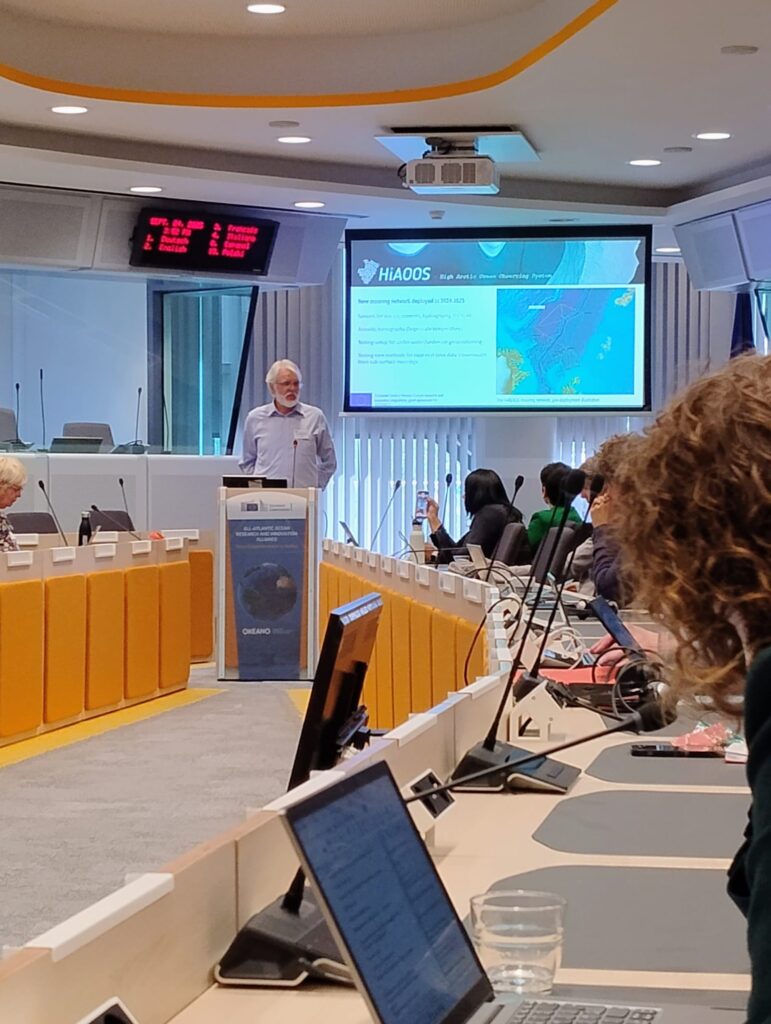New Momentum for Arctic Observing and Global Cooperation

At the AAORIA 2025 Polar Side Event in Brussels, polar scientists and policymakers sent a clear message: understanding the Arctic and Antarctic is no longer optional — it’s essential for predicting climate change, protecting ocean life, and supporting the communities that depend on a healthy Atlantic Ocean.
Arctic Observing in the Spotlight — and a Key Voice from Norway
One of the standout contributions came from HiAOOS’ Arild Sundfjord of the Norwegian Polar Institute, who delivered an important update on efforts to build a more coordinated Arctic Ocean Observing System. He highlighted progress from the EU-funded Arctic PASSION and HiAOOS projects, as well as new global coordination efforts under Arctic ROOS‘ ArORA task group, and Norway’s forward-looking Arctic Ocean 2050 research programme. These initiatives aim to create the long-term observing capacity needed to understand rapid Arctic change — from sea-ice loss to ocean circulation — and to connect Arctic data with Atlantic and global climate models.
Arild’s message was clear: the Arctic is changing faster than ever, and without sustained, internationally coordinated observations, the world risks losing its most sensitive early-warning system.
European Leadership: Research Infrastructures and the Power of Collaboration
The event showed strong momentum from Europe’s polar research community, including the EU Polar Cluster, of which HiAOOS is a member. Many of the Cluster’s members featured prominently.
Key contributions included:
- EU-PolarNet-2’s White Paper, presented by Gaël Lymer, outlining Europe’s long-term strategic priorities for polar research and improved coordination among nations.
- POLARIN, an EU-funded programme opening access to Arctic and Antarctic research infrastructures, introduced by Veronica Willmott. The project aims to ensure that polar science remains open, connected, and international.
- Presentations from the European Space Agency (ESA) and the Copernicus Earth observation programme, showcasing how satellite data and digital modelling are transforming polar monitoring.
Together, these efforts demonstrate the EU’s growing leadership in building observing systems that link polar change to wider ocean and climate processes.
A Global Push Toward the Next Polar Year
Looking to the future, the meeting highlighted one of the biggest upcoming milestones for the international science community: the 5th International Polar Year (IPY-5), planned for 2032–33. Gerlis Fugmann of the International Arctic Science Committee presented early plans for this major global initiative, which aims to unite nations, disciplines, and research infrastructures in a coordinated push for polar knowledge.
The upcoming Polar Year is expected to be broader and more inclusive than ever before — bringing together Arctic and Antarctic science, Indigenous knowledge holders, and early-career researchers to address the most urgent challenges facing polar regions.
A Call for Action: Invest Now, Act Together
The meeting concluded with a united Call for Action, urging governments, funding bodies, and research organisations to scale up investment in polar observing systems, support open data sharing, and strengthen international collaboration. The message underscored that polar research is essential for global security, sustainability, and resilience.
As the Atlantic acts as the bridge between the Arctic and Antarctic, what happens at the poles has consequences for everyone — from shifting weather and sea-level rise to fisheries and coastal economies.
Why This Matters for HiAOOS
For anyone interested in the future of the Arctic, this event marked a significant moment. Researchers are not only calling attention to rapid polar change — they are building the long-term systems needed to observe, understand, and respond to it. With strong European leadership, global coordination on the horizon, and voices from the HiAOOS community pushing Arctic observing forward, the foundations are being laid for a new era of polar science.
You can download and read the full event report from AAORIA Forum 2025 Polar Side Event: Polar Oceans and Climate – Advancing Synergies for Long-Term Global Collaboration, Meeting Report, Brussels, 2025.
